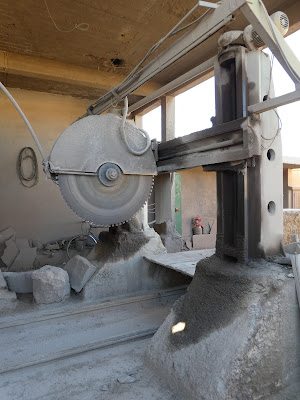We leave Fez and our wonderful riad with gifts from the riad staff--a scarf for me and a hat called a fez for Terry. To embark on our Sahara adventure, Mohammed wears his traditional djellaba.
We have a long day of driving across the Middle Atlas mountain range.
They were in the trees and...
...on the ground. This is the same species that so famously occupies the Gibraltar rock just across the Mediterranean from Morocco.
Continuing on toward the mountain range, we stop alongside the road when Mohammed spotted some puppies
There were 3 of them. We think their mother was herding sheep a short distance away. These little guys appeared thirsty so Mohammed fashioned a bowl from a plastic bag and filled it with water.
Once the puppies found the water, we continued on our drive.
The landscape is changing.
It's beginning to look more like a desert.
We overlooked the oasis town of Ziz
...and continue on to our destination for the night in the small trading village of Erfoud, which is the gateway to the vast Sahara Desert. Our hotel is the Chergui Kasbah and it appears to be an oasis!
Our room
We awoke to another beautiful day.
While waiting to leave the hotel, we stopped by to see the resident camels.
and give them some breakfast bread.
Before leaving Erfoud, we stopped by the fossils museum and learned about this geological phenomenon of the Sahara.
The desert was underneath the sea millions of years ago leaving this area filled with fossils of sea animals.
We learned how the fossils are cut....
...and polished
to make tables and countertops
and interesting pieces of art.
From here we board 4x4 vehicles to head into the Sahara Desert. We stop in the village of Rissani and walk through the souk (market).
The colorful spices always catch our eyes.
...as do the bags full of dates.
These gentlemen were enjoying their morning tea in the souk. They were open to visiting with us for several minutes.
We visited with her about her life and family.
Here's Mohammed with one of her sons. She has 5 sons and 1 daughter.
Of course, Mohammed translated for usShe was very grateful for the bag of clothing we provided.
Back in the 4x4s, we headed into the desert.
There are no roads, just sand dunes and lots of sand.
It was impossible to know how the drivers could find their way to the camp. Even tire tracks and rocks will get blown away by the wind and sandstorms, and the dunes are ever changing their shapes.
We pass by camels grazing on the sparse vegetation. We learned they are not called camels in Morocco. They are dromedaries and they are the tallest of the 3 species of camels.
We arrive at the camp and are greeted by the staff.
Each tent has a shower (far left), a sink (middle) and toilet (far right). Water is heated through solar power.
The dining tent
After lunch and settling into our tents, we are back on the 4x4s to go visit a nearby date farmer.
His name is Moha and he is 63 years old. He lived a nomad life until 1985 when he stopped here. There was nothing but sand here. He built a house
and planted 150 date palm trees.
We learned how he converted the desert into a green oasis.
by digging a well and installing an irrigation system--all self taught.
He showed us how he can climb a date palm tree
to manually pollinate the trees
He sells the dates from the trees but has gardens full of vegetables that he keeps to feed his family. Amazing that this is in the middle of the desert.
Back at our camp, we await our first sunset in the desert.
and sit down with a bottle of wine to wait.
Back at camp Mohammed introduces us to one of the cooks. She showed us how tagine is assembled.
First the meat, then the vegetables,
Then it's ready to cook on the stove for 45 minutes.
We were so excited to see the night sky in the desert without the interference of city lights. Our camera couldn't pick up the stars. This photo was taken by our friend, Ken, who has a great camera. There are millions of stars up there in the Milky Way...and the planet Venus.
To continue reading, scroll down and click on "Newer Post".































































No comments:
Post a Comment